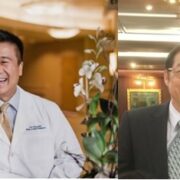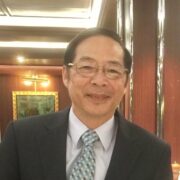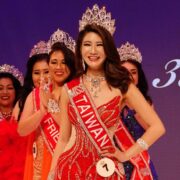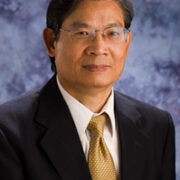The Person of Chang Chao-Ing
By: Nami Lee
Translated by: Philip Lee
– Born in a billionaire’s family in Taipei
– Single handedly lobbied for Taiwan
– Irreverent, playful, and lived a lifetime filled with fascinating events and charms of the times
My friend Shomei showed me a book on a Sunday at church during lunch and asked me if I have read it. The book was titled “Miyamae District Lot Number 90” (the Japanese edition of it was titled “International Lobbyist Chang Chao-Ing”). It was one of the bestselling books in Taiwan in 2006. She said in the book it mentioned many people who I may be acquainted with. Shomei’s comment piqued my interest and I began to turn the pages. I was quickly drawn into it by the author’s colorful story-telling writing style and his accounts of many well-known events and dramatic experiences. When I had finished reading it I realized Showmei was right: I did know some of the people mentioned in the book, namely the author’s aunt, Elder Gang Tsue-Tsai and some of his cousins. They were the individuals who I met decades ago at Min-Zhu Road Presbyterian Church in Taichung.
According to June, another friend of mine who was acquainted with the Chang family, the Chang Chao-Ing she knew was an easy-going and approachable person who was keen to help others, which was contrary to the stereotype of people born in prominent families. Yet, in the book’s preface he was characterized by Lee Ang who had known Chang Chao-Ing for a long time as a spendthrift and a playboy. I wanted to find out why he was characterized in such a manner and how his noble birth had shaped his character. As I began to read the book, I quickly realized that a person with his constitution was rare in my experience, i.e. having the access to the business and political leaders by the connections and influences established by his forefathers, having the resources to live a luxurious and carefree lifestyle, and having the proper upbringing for developing the courage of conviction to pursue the passion of his heart, the passion for defending Taiwan’s interests. By reading the smooth flowing passages in the book one may get a false notion that success came easily for him. But somehow I questioned whether that was true. I believed that success would not just fall from the sky without him holding a particular government office and having the courage to take action. Suppose an opportunity arose and you were in a position to do something that would promote Taiwan’s interest. Your decision to act or not to act would still depend on whether you took pride in being Taiwanese, having Taiwan’s best interest at heart, and having the courage to do something for Taiwan. Let’s take for example the success he had with getting the Japanese government to agree to shorten the visa approval process for visitors from Taiwan. This event took place while he was serving his post in Japan as a diplomat. When he started his job in Tokyo, visa applications for Taiwanese visitors to Japan took about two weeks. Mr. Chang discovered that there existed a discriminatory practice in Japanese government where the treatment for Taiwanese visitors was worse than that of Unequal Treaties. When Japanese visitors wanted to go to Taiwan, they needed only 24 hour for their visas to be issued, which was a far cry from the two weeks turn-around time required for their counterparts in Taiwan. The Japanese government cited the absence of official diplomatic channels between the two countries as the main reason for the lengthy processing. This was a lie because visa applications were processed entirely in the Japanese government’s office in Taipei. Furthermore, Taiwan officers traveling on government business could obtain visas to Japan much more quickly. But if you were an average citizen then you would have to get in line five o’clock in the morning and brace yourself for all kinds of hassle and red-tape. Chang Chao-Ing wanted to get off his chest the indignation he felt on behalf of all Taiwanese who wanted to travel to Japan. By chance he learned that under Japan Ministry of Foreign Affairs there was a consultation group called “Committee for Tourism Review”. From their pamphlets he discovered that one of the committee members Ms. Hashimoto was a well-known television producer. He asked his friend to set-up an appointment with her and began his lobbying efforts. He shared with Ms. Hashimoto some data from 1980 which showed that visitors from Taiwan accounted for more than five hundred thousand entries to Japan with an average spending of one million yen per visitor. This was equivalent to having a column of trucks carrying full loads of Japanese products ranging from electronic appliances to local souvenirs. On top of that, there were large numbers of Taiwanese students studying abroad in Japan. If a student were to get sick, should the parents wait for two weeks before they could visit their child? That would seem unreasonable. Ms. Hashimoto nodded her head as she listened carefully to Mr. Chang’s pleas. At the end of the meeting she verbally agreed to do something about it. She followed it up by taking money from her own pocket and invited the other committee members to discuss this matter over a meal. When all committee members were persuaded and a consensus reached, they called a formal committee meeting and summoned the officers from the Ministry of Foreign Affairs to attend. Under pressure the Ministry of Foreign Affairs responded to the committee’s demands for change. Within two months of working, the visa turn-around time was shortened from two weeks to two days.
Chang Chao-Ing was born in Tokyo in 1933. His mother, Gang Bao-Tsai, passed away when he was nine months old. He became a precious darling of a grandson raised and cared for by his grandparents. During the period between 1936 and 1945, his father Chang Yuei-Chen was exiled and barred from returning to Taiwan for his anti-Japanese activities in Guangdong and Shanghai. Chang Chao-Ing entered Jieng-Cheng Elementary School in Taipei in 1939. In the following year he transferred to a Japanese elementary school in Shanghai where he was reunited with his father. Two years after that, war broke out and he was sent back to Taiwan where he attended Beitou Elementary School in Taipei. In 1945, he entered Taipei Second Middle School. In 1948 he went to Hong Kong and studied in Royden House School, an English language high school. In 1952 he entered Meiji University in Tokyo and studied politics and economics. After his graduation in 1956 he began his graduate studies at Sophia University. In 1957 He completed his graduate program and returned to Taiwan. In the following year he was employed by the Executive Yuen and worked in Group Three of the Department of Media and Broadcasting. It was from that position he began his career in the public sector. His career highlights included the following:
In 1963 the film he produced titled “Three Days in Formosa” won the silver prize in the Marseille Film Festival competition.
In 1967 he served as the officer in charge of media in the Taiwan Consulate in New York.
In 1980 he headed up the media department in Tokyo.
In 1985 he retired from his career in the government and left Tokyo.
In 1994 he returned to his old post in Tokyo and headed up the media group. He also served as a consultant to the Taiwan Consulate in Tokyo.
In 1998 he retired for the second time and returned to Taiwan.
From 2003 to 2007 he enjoyed his life in retirement.
In 2007 he passed away at the age of 74.
During the span of his life he lived through the Japanese colonial period, the authoritarian rule of the KMT Party, the period of reform under President Lee Teng-Hui, and the current period of democracy in Taiwan. At each period of his life he excelled in the fights against oppression, totalitarianism, and injustice. By carrying on with such a strong conviction he surely had offended many people. Some called him a traitor to China. Others accused him of being a traitor to Taiwan. Some labeled him as a crony of the Song political circle. Some accused him of being a wasteful big spender. He treated those allegations with a nonchalant attitude. He took an impartial stance and worked diligently on what he thought was right during his thirty-one year career in government. He was keen to promote Taiwan’s interests and work hard to boost Taiwan prestige among the members of international community. He took on issues that would enhance freedom, democracy, and justice.
The number of important international and domestic events he had participated in was too many to enumerate. Let’s just look at one such event that took place in 1975, a time period when persecutions against political prisoners were very harsh in Taiwan. This was right after the death of Chiang Kai-Shek and the power had fallen into the hands of his son Chiang Chin-Kuo. One day Chang Chao-Ing received a message from his cousin Lu Chen-Hui that one of the opposition leaders Hsieh Chung-Min was in imminent danger of losing his life. Hsieh Chung-Min together with Pang Min-Ming had published two articles: “Declaration of Formosan Self-salvation” and “CitiBank Bombing Incident”. He was imprisoned on two occasions for those declarations. When the news came out that he has fallen ill while in prison, many people in Taiwan and overseas sought to rescue him. Three individuals went to Amnesty International for help. They included Chang Chao-Ing’s wife Yen Chen-Her, Chang Tsang-Hong’s wife Chang Ting-Lan, and Lin Li-Chang of Commission Church. They wanted to speak to the Secretary General of Amnesty International but with such short notice they did not get a response. Chang Chao-Ing then made a phone call to Irene Payne, who was the secretary of James Buckley, a Senator from New York State. He asked Ms. Payne to meet with his wife Yen Chen-Her to talk about the plight of political prisoners in Taiwan. The meeting took place over lunch the next day and concluded with a message conveyed to Senator Buckley that urged him to inquire into the wellbeing of Hsieh Chung-Min with the authorities in Taiwan. Shortly after that meeting Senator Buckley wrote a letter to the Taiwan Embassy expressing concerns about the harsh treatment of political prisoners in Taiwan. The Senator’s secretary handled this matter with great care. She first sent a copy of that letter to Yen Chen-Her and then called Chang Chao-Ing informing him that the letter has been sent by certified mail and there was no need to worry. Hsieh Chung-Min was transferred from prison to the hospital in less than a week’s time. When Hsieh Chung-Min came out of prison he could not figure out who had petitioned for his release. He only knew that Alliance for Formosa Independence had released the news about his illness. It wasn’t until 2004 when Yen Chen-Her showed him the copy of the letter and other documents that he learned the inner workings of the rescue.
One of the proudest things Chang Chao-Ing has done in his career was the fact that he never joined KMT. It was not an easy feat to serve as a senior officer in the government for thirty-one years without joining the Party. This was a testament to his uncanny ability to distance himself from KMT and his superb language abilities in English and Japanese that were highly sought after by those in power.
There is an age-old debate on whether a hero is the one who defines the times or is defined by the times. Taiwan was in a very weak position in international relations when Chang Chao-Ing served his posts in Japan and the U.S. He was able to overcome obstacles in the diplomatic front with his wisdom and skills. He established a stage for Taiwan to be seen and heard by building good relationships with the members of broadcasting community and news agencies. I believe that without having the right skill sets you could not seize the opportunity and take effective action no matter how motivated you were by your ideals. One may argue that Chang Chao-Ing was born with conditions favorable to his success and he did not have to work hard for it. On the subject of working hard, I would like to point out one passage in the book that described how dedicated he was in learning the English language. In 1948 at age fourteen and enrolled in Royden House School, a British institution, he had three tutors– one to teach him Chinese and two to teach him English. Still feeling inadequate, he ran newspaper ads and hired another English tutor. This tutor also taught him about democracy, the freedom of speech, the freedom of press, and told many tales of the great American thinker Thomas Jefferson. At one point in time, Chang Chao-Ing had aspirations of becoming a journalist because of those teachings. In fact, he recalled that Mrs. Margaret Hampson was one of the most influential people in his life, one who had shaped his career choices. When he entered Meiji University in Japan to study politics and economics, Chang Chao-Ing continued to strive for excellence in English by taking a night course in English Rhetoric at Sophia University. From these accounts we can get a glimpse on how hard he had worked on equipping himself.
Speaking of Sophia University, there was a side story there that Chang Chao-Ing would never forget. While a student at Sophia University, on one weekend he was invited by a judge from the Japanese High Court to attend a party. The purpose of the party was to select a wife for Prince Akihito. A woman he danced with that night, Michiko, turned out to be the woman who eventually became the wife of Prince Akihito. I believe this story would arouse the curiosity of readers who may want to learn more about the fascinating things that took place in Chang Chao-Ing’s colorful life.
Source from Nami Lee
Posted on 11/15/2018





